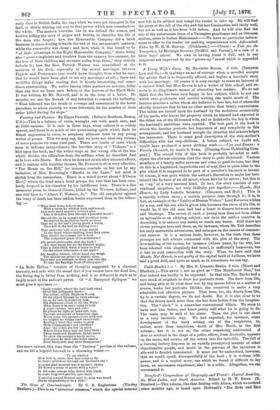A Young Wife's Story. By Harriette Bowra. 3 vols. (Sampson
Low and Co.)—It is always an act of courage when a novelist accepts the advice that is so frequently offered, and begins a heroine's story with her marriage. Of course it is easy enough to rouse an interest of a sinister kind, but Miss Bowra is not a writer of this school, and re- sorts to no illegitimate means of attracting her readers. We do not think that she has been very happy in her subject, which is not one which even good-taste and careful writing can make much of. The heroine marries a suitor whom she believes to love her, but of whom she shortly discovers that he has no other motive than family convenience. The tables are turned upon the husband by the malicious eccentricity of his uncle, who leaves the property which he himself had expected to the eldest son of the ill-treated wife, and so disinherits the boy in whom the husband's ambitions were centred. The best part of the book is where the heroine protests her innocence of any complicity in this arrangement, and her husband accepts the situation and acknowledges her innocence. There is some good description of the step-mother's difficulties with her step-children. A better subject, we doubt not, would have produced a more striking work.—Ups and Downs : a Family Chronicle, by Annie S. Swan. (Charing-Cross Publishing Com- pany.) The second title of this book is probably intended to anti- cipate the obvious criticism that the story is quite disjointed. Various members of a family suffer reverses and come to good-fortune, but they do this in a haphazard, improbable sort of way, that is quite alien to the plot which it is supposed to be part of a novelist's business to invent. Of course, it was quite within the author's discretion to make her hero inherit the fortune of an old miser, whose service he enters ; but this is an " up " of a very unusual kind. In fact, the story consists of con- ventional surprises, not very skilfully put together.—Bands, Not Hearts, by Lady Isabella Schuster. (Chapman and Hall.) This is a smartly written story ; a certain purpose runs through it; it is, in fact, an example of the "Vanity of Human Wishes." Lord Rareston wishes for a son, and the son who is given him becomes the curse of his life, or would be, if the old man had had a heart to discern between curses and blessings. The career of such a young man does not form either an agreeable or an edifying subject ; nor do es the author contrive in describing it to enforce any moral, or teach any lesson. Still there are clever passages here and there, as, for instance, where Mr. Tait describes his early mercantile adventures, and enlarges on the causes of commer- cial success. It is a serious fault, however, in the book that these passages are not always connected with the plot of the story. The love-making of the curate, for instance (whose name, by the way, has been selected with singularly bad taste), is sufficiently humorous, but it has no real connection with the story. When we have said that Hands, Not Hearts, is not guilty of the capital fault of dullness, we have said a great deal, and quite as much as in conscience we can say.


































 Previous page
Previous page